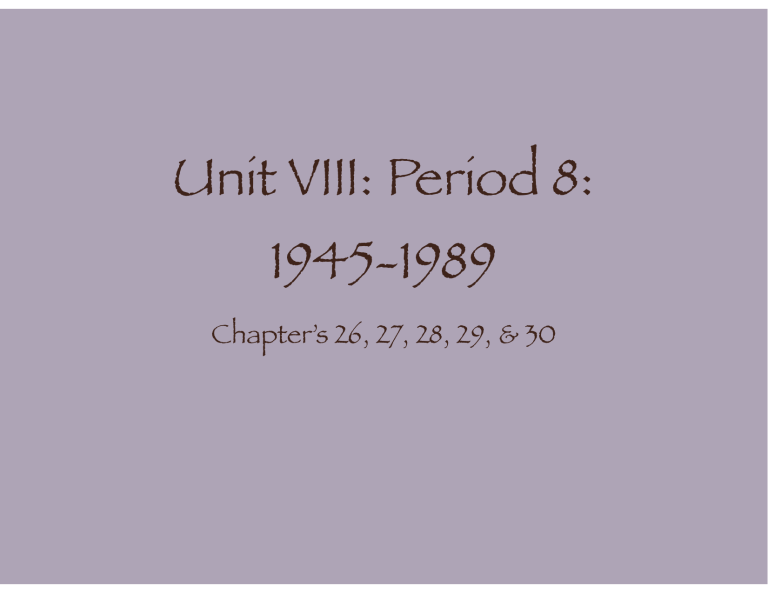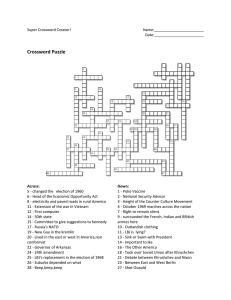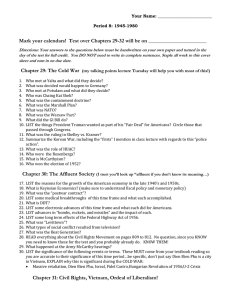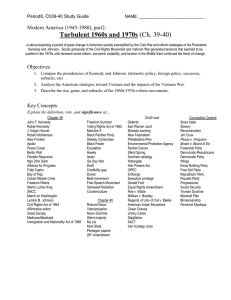
Unit VIII: Period 8: 1945-1989 Chapter’s 26, 27, 28, 29, & 30 Ch. 26: The Cold War Abroad and at Home, 1945-1952 • Holocaust! • 1945 Potsdam Conference! • Issue of the Cold War at first was control over post-war Europe! • Soviet “iron curtain” of satellite governments in Eastern Europe (Pol., Czech., Hun., Rom., Bulg.)! • Split in Germany and Berlin! • Was Stalin a cautious leader protecting Russian security or an aggressive dictator leading a communist drive for world domination Postwar America • GI Bill of Rights: (Servicemen’s Readjustment Act of 1944)! • Offered unemployment benefits, veterans hospitals, low-interest loans for businesses, homes, or farms! • Led to the “baby boom” generation Postwar America • Should we demobilize?! • • • • • Employment Act of 1946: federal govt to ensure economic growth! 1946 Atomic Energy Commission established! Bretton Woods Agreement (1944) among the Allies set the stage for US to become the economic leader of the noncommunist world! It created the International Monetary Fund (IMF) to stabilize exchange rates (based on US dollar)! 1947 General Agreement on Tariffs and Trade (GATT): broke up closed trading blocs and expanded international trade The Cold War Begins • Atomic dilemma! • US stressed inspection and control….why?! • Russia advocated immediate disarmament….why?! • Both “agree to disagree” and instead tried to take advantage of wartime gains: Russia exploited Eastern Europe and the US retained economic and strategic advantage over Russia...the result was the Cold War The Cold War Begins • Secretary of State George Marshall; Undersecretary of State Dean Acheson; and Policy Planning Staff Chief George Kennan! • Containment Policy: to patiently curb Russian expansion! • Military and economic assistance given to Greece and Turkey through the Truman Doctrine which marked an informal declaration of Cold War vs. the Soviet Union!Built a national consensus for containment policy by ! using the crisis in Greece The Cold War Begins • Marshall Plan: economic aid to European nations in order to revive their economies and hold free elections! • Stimulated trade with Europe and checked Soviet expansion! • Communist bloc countries turned down offer…why?! • NATO: US committed itself to the defense of Europe and “an armed attack against one considered an attack against them all” The Cold War Begins • Berlin Blockade incident: 1948 massive airlift of supplies was a US political victory! • Consolidation of US military branches! • 1947 National Security Act:! • Created the CIA, established the Department of Defense, and the National Security Council (NSC) to advise the President! • NSC-68: authorized expansion of military power to halt and overcome the Soviet threat The Cold War Begins • 1949 Mao’s communist forces defeat Chiang’s nationalists in China! • Sino-Soviet Treaty of mutual assistance! • US instead now focused more on building up Japan Korean War (1950-1953) • North Korea advanced over the 38th parallel in June 1950 with permission from Stalin and Mao; US-UN forces responded slowly pushing North Korean forces back to the 38th parallel; US then crossed over that line up to the Chinese border but then Chinese troops advanced in support and pushed the UN-US forces back to the 38th parallel! • General MacArthur recalled! • Chart pg. 814 Truman Domestic (Fair Deal) • Truman struggled domestically with inflation and labor • • • • unrest! Truman’s “Fair Deal” laid the groundwork for advances in health care, aid to education, and civil rights! 1947 Taft-Hartley Act outlawed some labor activities and gave the President “cooling off” period power! 1948 Election: Truman defeats Dewey (pg. 817)! 1948 Displaced Persons Act allowing people into the country Struggle over Civil Rights • Segregation continued in the South after WWII! • President’s Committee on Civil Rights! • 1948 election had the Dixiecrat Ticket with Strom Thurmond! • Truman desegregated the US armed forces nd 2 Red Scare • Loyalty in government issue! • Rosenberg Trial in 1951 for conspiracy to transmit atomic secrets to Russia! • House Un-American Activities Committee! • Alger Hiss and Whittaker Chambers! • McCarthyism to hunt down alleged communists in government! • Senator McCarthy from Wisconsin! • Instilled fear in Congress! • Sought to defeat the enemy at home! • Censured after going after US army officials • • 1952 Election: Eisenhower vs. Stevenson Eisenhower Domestic: • • • • Dynamic Conservatism/Modern Republicanism Ike wanted to reduce taxes, contain inflation, govern efficiently, keep military spending in check, encourage private initiative, and reduce federal activities Ike continued social measures of the New Deal, extended Social Security and raised the minimum wage 1956 Highway Act: interstate system developed for defensive purposes…other effects? • • Downfall of Senator McCarthy 1950s Civil Rights Movement: • • 1954 Brown vs. Board of Education of Topeka decision: Chief Justice Earl Warren desegregated schools “with all deliberate speed”…..this led to resistance in the South, Southern Manifesto in 1956, which defended segregation Little Rock Nine Incident: • Governor Faubus in Arkansas prevented the integration in Little Rock school with the national guard….Ike sent in paratroopers then nationalized the Arkansas national guard Ike set up a permanent commission for Civil Rights Rosa Parks, MLK, bus boycott in Montgomery, Alabama • • • • • MLK’s “passive resistance” campaign Sit-inns, Kneel-inns, Wade-inns Southern Christian Leadership Conference & Student Nonviolent Coordinating Committee “beat generation” rebelled against the conformity and materialistic society of the 1950s Reaction to the Soviet satellite Sputnik • • • • NASA; National Defense Education Act US needed to recommit to the pursuit of excellence • • • • • Levittown: flight to the suburbs Economic boom, population growth, yet Cold War insecurity Demand for consumer goods fueled industrial expansion Heavy government spending Affluence in the 1950s; baby boom generation; television; highest standard of living in the world; “togetherness” concept; social theme of consumerism • • • • Armistice in Korea—38th Parallel “New Look” defense policy cutting back on money for US defense Secretary of State John Foster Dulles • Reliance on “Massive Retaliation” French Indochina • French defeat at DienBienPhu in 1954; convention at Geneva; unification election never held…why? • NVN- Ho Chi Minh; SVN- Diem Attempted to drive a wedge between China and Russia US commitment to defend Formosa deterred China’s advance due to nuclear threat Suez Crisis in the Middle East when Britain and France invaded Egypt to re-gain control of the canal from Nassar • • • • US became the Western force in the area after Britain and France withdrew • • • • • • • Involvement in Beirut and Lebanon in 1958 Other covert operations in Guatemala and Iran Nuclear test bans Sputnik Khrushchev U-2 Spy Plane shot down Ike warned the US of its “growing military industrial complex” 1960 Election (chart pg. 861) • • • Kennedy defeats Nixon Impact of television • • • • “New Frontier” to get America moving again Problems in Congress Economic growth under Kennedy due to defense and space spending Large tax cut • • • • Kennedy moved slowly on Civil Rights (fox rather than a lion…meaning he waited for a national consensus before acting) CORE “Freedom Riders” incident Kennedy appointed African Americans to government positions MLK March on Washington (August 28, 1963) Counterinsurgency buildup to create an alternative to Ike’s massive retaliation policy Flexible Response: options to counter Soviet threat • • • Green Berets 1961 Berlin Crisis • • • Kennedy said the defense of Berlin was essential Soviets build the Berlin Wall in response…led to a stalemate Containment in Southeast Asia & Latin America: - Financial and technical assistance to 3rd World countries Peace Corps & Alliance for Progress in Latin America Support for Diem in SVN then allowed for a coup to replace him • • • sent advisors, not troops, to Vietnam Bay of Pigs Fiasco • • • • April 1961: Plot to oust Castro from power Cuban exile troop invasion failed to get U.S. air cover…Kennedy took blame for failed attempt to topple Castro • Cuban Missile Crisis • October 1962: Kennedy rejected diplomacy (Turkey for Cuba), then ordered a quarantine of Cuba • 2 messages from Khrushchev: • Kennedy accepts the 1st one that Russia would remove the missiles in Cuba in exchange the U.S. pledged that it never would invade Cuba • “secret” agreement as well “hot line” put in place to speed up communication from Moscow to D.C. • Kennedy’s moment of triumph ensured the escalation of the arms race • Kennedy assassination • • • • • Lee Harvey Oswald Jack Ruby Conspiracy? What do you think? Lyndon Baines Johnson sworn in aboard Air Force One got Kennedy’s tax and civil rights bills passed in 1964 1964 Civil Rights Act: made segregation illegal and established the EEOC and protected voting rights • • • Title VII added gender to prohibition of discrimination War on Poverty: focus was on self help Immigration Act of 1965 • • • Replaced racist 1920s laws Great Society: liberal reform program (chart pg. 874) • • • • Medicare and Medicaid Federal funds for education 1965 Voting Rights Act Countercultural Society in the 1960s • Free Speech Movement at Berkeley, CA Students for a Democratic Society (SDS) • • • • • wanted to rid American society of poverty, racism, and violence Protests at colleges over the Vietnam War Spawned cultural uprising 1969 Woodstock event • • Hippies & Yippies Counterculture Continued: • Extremism of Black Power and Black Nationalism April 1968 MLK assassinated Rise of Ethnic Nationalism • • • • Cesar Chavez (National Farm Workers Association) Women’s Liberation Movement • • • Betty Freidan’s 1963 book, The Feminine Mystique National Organization of Women (NOW) formed • • • • Chart pg. 875 Constitutional guarantees extended Reapportionment process Achieved greater social justice by protecting the rights of underprivileged and by permitting dissent and free expression to flourish Vietnam (chart pg. 884) • LBJ expanded US covert operations August 1964 Gulf of Tonkin incident • • • • • • Result: “blank check” given to LBJ by Congress to use whatever forces he wanted 1965 air strikes in NVN led to steady military escalation…limited war, yet 500,000 troops sent over from 1965-1968 Bloody stalemate and failure in both NVN and SVN General Westmoreland’s “search and destroy” tactics failed 1968 Tet Offensive by Vietcong in SVN cities • • US/SVN repulsed the attack ! 1968 Election: • • • • • • LBJ decides not to run again in 1968 RFK assassinated George Wallace was Independent party candidate Humphrey gets Democratic nomination yet riots outside convention hall in Chicago Nixon (Republican) wins which signaled a reaction against the growth of federal power • • The Youth Movement Young Americans for Freedom (YAF) • • Demanded a rollback of big government at home and called for victory in Vietnam New Left & SDS • • Envisioned a nonviolent youth movement transforming the US into a “participatory democracy” in which individuals would participate in making the decisions that affected their lives Helped mobilize public opposition to the Vietnam War • • • Mario Savio and the Berkeley Free Speech Movement Political demonstrations on college campuses increased Kent State & Jackson State • • • • Hippies • Disdained employment and consumerism, preferring to make what they needed, share it with others, and not want what they did not have • LSD’s impact in the 1960s Music Revolution • Woodstock festival • The Beatles Sexual Revolution • Roe vs. Wade (1973) Gay Liberation • • The public association of the counterculture, the sexual revolution, and gay liberation with student radicalism and ghetto riots swelled the tide of conservatism as the 1960s ended. The social and cultural upheavals of the late 1960s unfolded against a backdrop of frustration with the war in Vietnam and the disillusionment with liberalism. domestic revenue sharing policy shifted responsibility for social problems from Washington to state and local authorities Nixon used the Supreme Court to appeal to Southerners • • • “Southern Strategy” to attract white Democrats into the GOP fold Nixonomics described economic disaster in the early 1970s • • • • Nixon cut government spending and encouraged the Fed to raise interest rates, resulting in stagflation (inflation and recession) High inflation, negative balance of trade, weak US dollar He abandoned his resistance to controls and placed a 90 day freeze on wages and prices • • • • • July 21, 1969 Neil Armstrong walked on the moon Granted 18 year olds the right to vote Occupational Safety and Heath Administration (OSHA) Environmental Protection Agency (EPA) 1973 War Powers Act: required the President to consult with Congress before sending American troops into action overseas Realpolitik • • • • A pragmatic approach stressing national interest rather than ethical goals Nixon sought to check Soviet expansionism and to reduce superpower conflict, to limit the nuclear arms race, and to enhance America’s economic well-being Nixon chose Henry Kissinger to manage diplomatic relations Détente • • • • A relaxation of tension A plan to use American trade to induce Soviet cooperation while at the same time improving USChinese relations Nixon visits China and officially opens up diplomatic relations SALT I Treaty with Russia • • To control arms race • Vietnam • Vietnamization • Cambodian Invasion in 1970 • Tried to stop supplies on the Ho Chi Minh trail • Appealed to the great “silent majority” of Americans • Jan. 27, 1973 peace treaty with NVN • “Peace with honor”? • Release of prisoners, US withdrawal, NVN promise to leave SVN alone • Vietnam chart pg. 906 1975 fanatical Khmer Rouge (Cambodian communists) led by Pol Pot, took power and turned Cambodia into a genocidal killing field, murdering some 2 million people Nixon Doctrine: redefined America’s role in the Third World as that of a helpful partner rather than a military protector War in the Middle East during the 1970s • • • • Impacted US economy - October War (Yom Kippur War) in 1973 • • • Egypt & Syria vs. Israel Result was the Arab oil embargo by OPEC US was dependent on other countries for its economic well-being “Shuttle Diplomacy” • • • Kissinger flying from one Middle East capital to another for two years He negotiated a cease-fire, pressed Israel to cede some captured territory, and persuaded the OPEC nations to end the oil embargo • • • • • • • Plumbers • Tried to discredit opposition to Nixon • CREEP Daniel Ellsberg and the Pentagon Papers • Secret document history of US involvement in Vietnam 1972 Election: Nixon defeats McGovern overwhelmingly Deep Throat (W. Mark Felt…#2 man in FBI) • Was the source for Washington Post reporters Carl Bernstein and Bob Woodward for the Watergate scandal Supreme Court ordered the release of White House tapes Impeachment charges voted on: Abuse of presidential authority Nixon resigns (Aug 9, 1974); Ford becomes president Economic & Energy Crisis in the 1970s • Nixon, Ford, & Carter all struggled with this crisis Tax cuts led to more consumer spending but inflation continued Focus on more fuel efficient cars Economy was in transition • • • • • Businesses developed new technology to adapt • Inflation was caused by the following: • • Vietnam war costs, worldwide food shortage, increase in petroleum prices Wage increase failed to keep pace with inflation • • • • • • • Cultural trends & the Personal Computer AIDS, Changing Gender Roles, & Sexual Behavior Equal Rights Amendment in the 1970s Changing economy: deindustrialization Affirmative action; Immigration Control; Indian Self-Determination Act Growing conservative movement William Buckley, Phyllis Schlafly, Ronald Reagan pardoned Nixon outlawed CIA from using assassination as a tool of American foreign policy OPEC problem 1975 South Vietnam fell • • • • • • US response? lost 1976 election to Carter • • • • • • • • Carter’s unwillingness to take political risks Alaska Lands Act; Three Mile Island incident; Love Canal incident in Niagara Falls Carter returned Panama Canal control to Panama Camp David Accords in 1978 between Egypt Sadat and Israel Begin 1979 Iranian Revolution & Hostage Crisis Carter Doctrine: US would fight to protect the vital oil supplies in the Persian Gulf SALT II: passed in the House but failed in the Senate Cold War tensions rose again when Russia invaded Afghanistan in 1979 growing conservative mood in the US by 1980 Reagan defeats Carter in 1980 Election (pg. 934) Reagan (“the great communicator”) believed in less government, balanced budget, family values, and peace through increased military spending • • • • • • • Christian Right supported him along with the Moral Majority Presidential Republican realignment PATCO air traffic controllers strike in 1981 Commission to look at Social Security trust fund Supply-Side Economics • • • • • Cutting government spending and sharply reducing taxes Private sector would shift resources to productive investment (“trickle-down effect”) Reduce government intervention in business Deregulation Focus was on cuts in social spending and reduced taxes • • • • • The struggle was trying to avoid huge deficits because of increased defense spending This led to a federal budget deficit 1986 Gramm-Rudman Act called for across the board spending cuts to bring the deficit under control Foreign trade deficit problem led to massive borrowing growing inequality of wealth in America income disparity was the product of economic restructuring and Republican tax policy 1986 Tax Reform Act • • • • • • Created a more simplified tax system which lowed the tax percentage for the top bracket and raised it slightly at the low end AIDS epidemic War on Drugs • • • • steady increase in defense spending • Russia deemed the “evil empire” • Strategic Defense Initiative (SDI) • Aka “Star Wars” • Use of ground and space based systems to protect the US from nuclear attack • Led to a dangerous level for the arms race involvement in Beirut during the Lebanese civil war problem with Nicaragua with the Sandinista communist based government • US worked with the Contra exiles to try to oust the Sandinista government • Led to 1984 Boland Amendment- stop giving money to the Contras 1983 invasion of Grenada to prevent communists from gaining a military base • 1985 Iran-Contra Affair • • • • Antitank missiles in exchange for hostage release (arms for hostages) • Israel involved • Result?--more hostages taken Oliver North (NSC) used profits from arms sales to Iran to help finance the Contras in Nicaragua • Unconstitutional…was Reagan aware of it? Reagan – Gorbachev relations Intermediate-range Nuclear Forces (INF) Treaty: disarmament • Nuclear Arms Control treaties pg. 942



